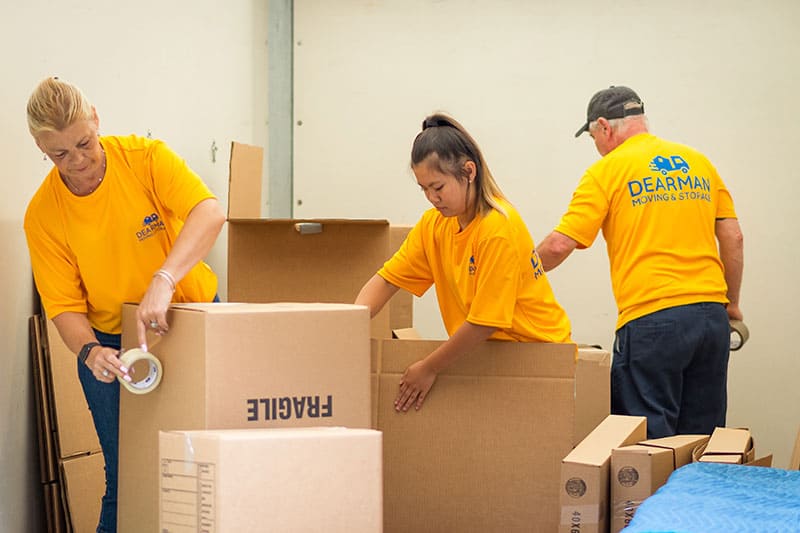Technology solutions to track and optimize domestic shipping
Understanding the Inclusions of moving and Freight Forwarding in the World of Worldwide and domestic Delivery
Steering with the complexities of moving and Freight forwarding can be difficult. Both procedures involve distinctive treatments and needs that are vital for effective transportation. Recognizing the differences in logistics, documents, and risk management is important for services and people alike. This understanding can substantially impact the effectiveness and security of deliveries. However, numerous are not aware of the particular components that affect the total experience and outcomes. What elements should one think about to assure a smooth transition?
The Basics of moving and Freight Forwarding
moving and Freight forwarding are fundamental components of the global logistics market. They assist in the transfer of goods and personal belongings throughout residential and international borders. moving primarily involves the moving of households or individuals, encompassing domestic and business needs. It commonly includes packing, packing, transferring, and unpacking things at the destination. In contrast, Freight forwarding is concentrated on the shipment of goods, usually wholesale, making use of different transport modes, such as air, land.freight, or sea forwarders serve as middlemans, coordinating logistics to assure prompt shipment while navigating with facility laws and customizeds treatments. Both procedures need mindful preparation, company, and interaction to assure efficiency and minimize disruptions. Understanding these fundamentals is important for anyone entailed in logistics, as they lay the groundwork for advanced elements of shipping and transportation management.
Trick Components of Freight Forwarding Services
Freight forwarding solutions encompass several essential components that ensure smooth transportation of items. Secret duties of Freight forwarders consist of handling logistics, coordinating deliveries, and handling personalizeds clearance. Additionally, comprehending vital delivery documentation is critical for compliance and effective motion of freight.
Freight Forwarder Responsibilities
A reputable Freight forwarder plays an important function in working with the transport of items, ensuring that deliveries are handled successfully and in conformity with laws. Their obligations incorporate various key tasks, consisting of selecting excellent transport paths, negotiating Freight prices, and taking care of logistics. They act as intermediaries between carriers and carriers, ensuring that freight is properly packaged and classified for risk-free transportation. Additionally, Freight forwarders track deliveries, providing updates to customers concerning the standing and anticipated distribution times. They additionally analyze and handle dangers associated with transportation, advising insurance policy options as required. By facilitating interaction and documentation, Freight forwarders improve the shipping process, lowering possible delays and boosting total supply chain performance.
Delivering Paperwork Basics

Understanding Custom-mades Clearance and Documents
Precise documentation is essential in the customizeds clearance process, as it ensures compliance with different laws. A review of customs regulations highlights the complexities encountered by carriers and Freight forwarders. Common clearance challenges can significantly influence delivery timelines and prices, making understanding this aspect vital for reliable logistics.
Value of Accurate Documentation
Steering via the intricacies of international delivery calls for an eager understanding of custom-mades clearance and the essential function of documentation. Exact paperwork is necessary for making sure that deliveries adhere to guidelines and reach their destinations immediately. Effectively prepared records, including expenses of lading, commercial invoices, and packing listings, promote smooth communications with custom-mades authorities. Mistakes can result in shipment hold-ups, penalties, and even confiscation of products. Extensive documents help in tracking deliveries and settling disputes. Consequently, services participated in moving and Freight forwarding have to focus on meticulous documents practices to browse the elaborate landscape of global shipping properly. This persistance not just simplifies operations yet also improves customer complete satisfaction by guaranteeing timely shipment.
Customizeds Rules Overview
Guiding custom-mades laws is an important element of global profession that straight impacts the success of moving and Freight forwarding operations. Efficient personalizeds clearance calls for an understanding of different guidelines, consisting of tariffs, tasks, and import/export constraints. Exact documents is essential, as it assures compliance with legal requirements and assists in the reliable activity of items across boundaries. Key files typically include business invoices, packaging listings, and bills of lading, which give comprehensive info regarding the shipment. Furthermore, customs brokers play a critical duty in steering intricate laws, working as middlemans between carriers and customizeds authorities. By maintaining complete knowledge of custom-mades processes, services can considerably lower delays and minimize prices connected with worldwide delivery.
Common Clearance Difficulties
Various obstacles can arise during the personalizeds clearance process, commonly making complex the movement of goods throughout boundaries. One substantial concern is inadequate documentation, which can bring about hold-ups and penalties. Importers and merchants have to guarantee all called for documentation, such as billings, packing checklists, and certificates of beginning, is full and accurate. In addition, discrepancies in assessment can set off analysis from custom-mades authorities, resulting in added responsibilities or examinations. Language barriers might also posture challenges, as miscommunication can cause misunderstandings pertaining to regulations. Moreover, modifications in customs laws can develop complication, demanding consistent vigilance by carriers. Ultimately, overcoming these clearance challenges requires comprehensive prep work and a clear understanding of custom-mades demands to help with smooth international purchases.
Product Packaging and Identifying Needs
Although frequently overlooked, product packaging and labeling demands play a vital role in the shipping process, making certain that products are protected and conveniently identifiable throughout their trip. Proper packaging safeguards items from damages throughout transportation, while likewise helping with efficient handling and storage. Utilizing ideal materials, such as bubble cover, foam, or tough boxes, can protect against damage and loss.Labeling is similarly important. Clear and precise tags share essential information, consisting of the location, dealing with instructions, and contents. Labels should abide by laws certain to global and residential shipping, which may include hazardous materials recognition or personalizeds declarations.Moreover, standard labeling practices simplify the monitoring process and boost total logistics effectiveness. By adhering to product packaging and labeling requirements, businesses minimize the threat of delays, damages, or misdelivery. Inevitably, these practices add substantially to the success of moving and Freight forwarding operations, making certain a smooth shipping experience for all celebrations involved
Tracking Deliveries: Significance and Techniques
Reliable packaging and labeling established the foundation for effective delivery management, however tracking shipments is just as necessary in the delivery process. Delivery monitoring offers real-time visibility, which helps customers and organizations check the development of their items. This transparency improves consumer fulfillment, given that clients can remain notified concerning distribution timelines and any kind of prospective delays.Several techniques promote reliable tracking. Barcode scanning is a common technique, making use of unique identifiers to keep track of packages throughout their trip. In addition, GPS innovation enables precise location tracking, permitting timely updates and boosted logistics monitoring. Many shipping business now provide electronic platforms and mobile applications that give users with very easy access to tracking information.The significance of delivery monitoring can not be overemphasized; it decreases the danger of shed or harmed items, boosts functional performance, and fosters count on between shippers and recipients. Integrating reliable tracking techniques is vital for effective residential and international shipping operations.
Insurance policy Options for Your Item
Safeguarding insurance policy for items en route is an essential consideration for organizations and individuals alike. Insurance options differ based on the sort of delivery, value international relocation of items, and details threats involved. Usual types consist of provider responsibility, which covers loss or damage while in transit, and full-value insurance policy, offering extensive insurance coverage for the total worth of the goods.Shippers may also consider aquatic insurance for global shipments, safeguarding versus risks connected with sea transport. It is important to analyze the particular demands of the shipment and evaluate the terms of any kind of policy.Furthermore, comprehending exemptions and limitations is important to avoid possible voids in coverage. Shippers need to involve with insurance specialists to check out tailored options that fit their unique circumstances. Inevitably, buying the appropriate insurance can alleviate financial risks and provide assurance throughout the delivery process.
Choosing the Right moving and Freight Forwarding Service
When picking a relocating and Freight forwarding service, it is important for businesses and individuals to meticulously examine their particular needs and concerns. Aspects such as the quantity of goods, destination, and timeline play a considerable function in this decision-making procedure. Looking into numerous providers is advisable; comparing their solutions, pricing, and consumer evaluations can reveal useful insights.Additionally, it is needed to consider the experience and knowledge of the company in dealing Recommended Reading with particular sorts of cargo, specifically for worldwide deliveries that may entail customizeds clearance. Openness in prices, including any surprise costs, need to likewise be scrutinized.Furthermore, examining the level of customer assistance used is necessary, as timely communication can alleviate issues throughout transit (shipping companies). Validating the availability of insurance options guarantees that goods are secured throughout the delivery process. By taking these organizations, people and actions can make educated choices that align with their logistics needs
Regularly Asked Questions
What Types of Product Can Be Shipped Worldwide?

Exactly How Do Shipping Costs Differ In Between Different Carriers?
Delivering costs vary considerably in between providers as a result of elements such as service speed, freight type, range, and added services offered. Each service provider's pricing design shows these variables, influencing overall delivery costs for customers.
Can I Ship Hazardous Products or Perishables?
Delivering unsafe materials and perishables undergoes stringent regulations. Providers typically need specific product packaging, labeling, and documentation. Carriers should assure compliance with neighborhood and worldwide legislations to avoid fines and assure secure transport.
What Should I Do if My Delivery Is Delayed?
When confronted with a shipment delay, one must first speak to the provider for updates. Assess any notifications obtained, evaluate alternate remedies, and keep all celebrations notified regarding the scenario to lessen disruptions.
Exist Weight Purview for Shipping Containers?
Weight restrictions for shipping containers differ relying on variables like container size and delivery policies. Typically, conventional containers have an optimum gross weight of around 30,000 to 32,000 kilograms to guarantee safe transport and handling. In comparison, Freight forwarding is concentrated on the delivery of products, often in mass, making use of numerous transport settings, such as sea, air, or land.freight forwarders act as intermediaries, coordinating logistics to guarantee timely distribution while navigating with complex regulations and customizeds procedures. Trick duties of Freight forwarders include managing logistics, coordinating shipments, and dealing with custom-mades clearance. A reliable need movers now Freight forwarder plays a vital function in coordinating the transportation of goods, making sure that shipments are managed effectively and in compliance with guidelines. Efficient packaging and labeling established the structure for successful shipment monitoring, but tracking shipments is just as essential in the delivery process. Numerous shipping companies now offer electronic platforms and mobile applications that offer individuals with very easy access to tracking information.The relevance of shipment tracking can not be overstated; it decreases the risk of shed or damaged products, enhances operational performance, and fosters depend on in between recipients and carriers.